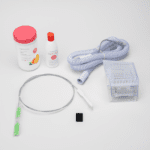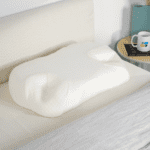We all want to sleep well, slow the effects of aging, and maintain our brain health and cognitive skills for the entirety of our lives. Melatonin has a pivotal role to play in all those things.
What Makes Melatonin So Powerful For Our Health?
Melatonin is a regulator of circadian rhythms. By keeping the circadian clocks and rhythms in sync, melatonin enables regular sleep-wake cycles (and with them, sound, refreshing sleep). So much of the body’s daily activity is tied to circadian timing—everything from metabolism and appetite to immunity and cognition—which means melatonin’s circadian-regulating power has widespread benefits for health and functioning beyond sleep.
A powerhouse antioxidant, melatonin protects cell health and helps limit the damage from free-radical cells. It’s also a potent fighter against the growth and spread of cancer cells. And melatonin delivers specific and important protection to the brain.
Pineal Melatonin Matters To Sleep, Aging, and Brain Health
The pineal gland, roughly the size of a pea, is located in roughly the exact center of the brain. While this tiny gland produces several different neurochemicals and hormones that affect physiological health and functioning, melatonin is its most significant product. Melatonin IS made elsewhere in the body, but the melatonin that’s made by the pineal gland is unique and distinctly important. It’s this specific, pineal-derived melatonin that regulates circadian rhythms. Pineal melatonin production is triggered by darkness. The rise in pineal melatonin functions as a signal to the master circadian clock that keeps the master clock synchronized for the roughly 24-hour daily cycle of activity it oversees.
When the pineal gland can’t function optimally, this critical supply of melatonin is disrupted. And disruption of this circadian-signaling melatonin can lead to serious negative consequences for sleep, for biological aging, and for the risk of neurodegenerative diseases including Alzheimer’s.
One way the pineal gland loses normal functioning is from a process known as calcification. Calcification is the build-up of calcium deposits. Calcification occurs in many areas of the body, including the heart and the arteries, the brain, and in joints and muscles. But the pineal gland is especially vulnerable to calcification. In fact, calcification happens more aggressively in the pineal gland than in any other place in the body.
Melatonin Protects Brain Health and Slows Aging Process
Melatonin’s role in offering protection for brain health and functioning is well documented. Among melatonin’s many functions in the body, it serves as an anti-inflammatory and anti-oxidant. The brain is particularly vulnerable to damage from inflammation and oxidative stress, and keeping melatonin levels up can help reduce that damage. Melatonin also works directly to prevent the formation of two proteins—tau and beta-amyloid—that are key biological markers of Alzheimer’s disease. We benefit from a robust supply of melatonin over the span of our lifetime to maintain healthy cognitive function and lower our risk for developing Alzheimer’s.
There is promising research showing that melatonin may be an effective treatment for Alzheimer’s. Studies show that melatonin can slow the progression of Alzheimer’s and reduce symptoms associated with the disease, including sleep disruptions, cognitive decline, and sundowning, which is the increased confusion and agitation that happens late in the day in some people with dementia.
Melatonin also has broad effects on overall biological aging. Melatonin levels drop with age—that’s something that happens independently of pineal calcification. Low melatonin levels are associated with an acceleration of biological aging. Disruptions to the circadian system are critically involved in aging and affecting longevity, and low melatonin levels make the circadian system work less effectively. Of course, low melatonin levels and out-of-sync circadian clocks also contribute directly to sleep problems, which also affect aging. There’s research in animals that shows boosting melatonin levels can extend lifespan.
Calcification in the pineal gland interferes with melatonin production, elevating risks for neurodegenerative disease, accelerating aging, and making sleep disruptions more common and more severe. That leads to a big question: can we take steps to reduce pineal calcification, to protect sleep, brain health, and longevity?
Can We Slow Pineal Calcification With Better Sleep?
Scientists still have a lot to learn about how pineal calcification happens, and how this calcification affects aging and contributes to neurodegenerative diseases such as Alzheimer’s. But there is evidence of some of the factors that may contribute to calcification. That research gives us a basic blueprint for steps we can take that may limit and slow calcification of the pineal gland, and disruptions to healthy melatonin. And here’s where things get really interesting—because sleep itself can help address at least some of the factors that scientists think may accelerate calcification.
Chronic Vascular Inflammation
The pineal gland is packed with arteries, veins and capillaries, and it undergoes an extremely high rate of blood flow. That makes this gland particularly vulnerable to vascular inflammation. And research shows this form of inflammation may trigger calcification. Sleeping well—both getting enough sleep and making sure sleep is restorative, is one important way to limit chronic inflammation, especially as we age.
Other anti-inflammatory habits? Staying at a healthy weight, getting regular exercise, eating a whole food diet low in processed foods and sugar. Those habits have the added benefit of helping to improve sleep, too! Here’s what to know about how sugar interferes with healthy sleep. And here’s a primer on the benefits of exercise to sleep.
Hypoxia in the Brain
Hypoxia is a lack of oxygen supply. Brain hypoxia occurs when the brain is deprived of adequate oxygen. Hypoxia in the brain may contribute to the build-up of calcium deposits in the pineal gland. You’ve heard me talk about hypoxia a lot in relation to one of the most common and problematic sleep disorders: obstructive sleep apnea. The impaired breathing of sleep apnea deprives the brain of adequate oxygen. Hypertension also leads to brain hypoxia. Both of these conditions go frequently un-diagnosed, leaving people exposed to the harmful effects of hypoxia. By diagnosing and getting treatment for sleep apnea and high blood pressure, we reduce the risks of insufficient oxygen supply to the brain—and this may help reduce calcification in the pineal gland.
In recent research, sleep apnea has now been directly linked to accelerated aging. And there’s also significant evidence that the disruptions to sleep and oxygen levels from sleep apnea may contribute to greater risk for Alzheimer’s disease.
There’s some fascinating science underway that’s exploring ways to de-calcify and rejuvenate the pineal gland. But we all can take steps in our daily lives to keep this melatonin-making gland healthy and functioning well. And those steps start with improving our nightly sleep.
Shop the Best Orthopedic MattressesBefore Taking Melatonin
Melatonin levels decline for several reasons, and aging is only one of them. Medical conditions, genetics, ill-timed light exposure, and changes to daily schedules are other factors that contribute to low melatonin. Likewise, common sleep problems can occur as the result of any number of lifestyle and health factors, as well as from sleep disorders that exist independent of a melatonin deficiency.
Before you add melatonin to your supplement regimen, it’s important to understand whether melatonin is right for you, and to know how much to take, and when to take it.
Melatonin, at the right dose, can help many people fall asleep more quickly. But there isn’t clear evidence about whether melatonin improves overall sleep and sleep quality. Melatonin is frequently effective for short-term use for jet lag. For insomnia symptoms, melatonin is most effective when used in combination with other sleep-boosting methods, including other natural sleep aids, changes to your sleep environment and to daily and nightly routines–for example, using blue-light-blocking glasses for screen time in the evenings.
I advise that everyone’s first step be a discussion with your doctor. Equally important is the opportunity for your physician to work with you to diagnose any underlying medical conditions, including the presence of a sleep disorder.
If you are taking melatonin for sleep, in consultation with your doctor, it’s important to pay attention to the timing of your nightly dose. It can take some adjusting to time your dose so its effects peak at the right time. If you take melatonin too early, it will kick in too soon, and if you take it too late, you may feel groggy the next morning. If you’re taking melatonin in pill form, I recommend taking 0.5 mg to 1.5 mg about 90 minutes before bed.
References
Ask the Sleep Doctor
Have questions about sleep? Submit them here! We use your questions to help us decide topics for articles, videos, and newsletters. We try to answer as many questions as possible. You can also send us an email. Please note, we cannot provide specific medical advice, and always recommend you contact your doctor for any medical matters.































